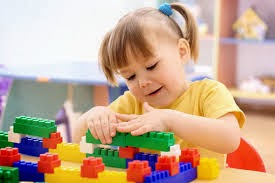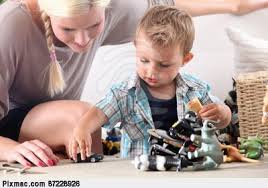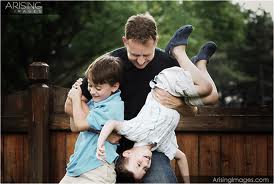
As parents and children are getting bombarded with TV adds and making their holiday toy lists, let’s give thought to what make a good toy. Which toys can actually make our kids smarter? Should we just let kids be kids and not focus too much too soon on education?
Electronic toys limit creativity and disconnect children from others.
Picture a family on a road trip. The kids are each playing their own their own Game boys, watching a movie or listening to their ipod. Dad has the radio on and Mom is checking her email. Everyone’s disconnected. No one’s talking or interacting. It’s deceptive because there’s no arguing, the kids are quiet, but car time is probably your most vaulable bonding time.
When our family drove from Tucson to the farm in Iowa, we played the alphabet game, sang songs, practiced our jokes, or read. You have a captive audience and it’s an opportunity to ask questions, listen and transmit your values.
Will that toy you’re considering stretch your child mentally, making them think and be more creative? Can it be used in different wys? Will it engender cooperation, empathy, a desire to learn more?
Or does the toy do too much? Does it simply entertain? Is there only one way to use it? Is it just something to get? Did your kids ever really play with Ferbie? Is it tactile, does this toy cause children to grow up too fast? Does it agree with your values about what’s important?
A good toy makes sure that the child does the playing that requires them to use their imaginations and interact with others.
Research shows that when children are involved in creative play their play lasts longer, is more focused, involves more children, and they cooperate more. They become more socially competent. Creative play develops focused attention, memory, logical reasoning skills, language and literacy, the ability to reflect on one’s own thinking and to take another’s perspective.
What’s so wrong with electronic toys?
They don’t engender creative play, they’re highly addictive and make life too simple. Is your child frustrated or bored? Just push this button.
Remember tick tack toe, jacks, pick up sticks? The classic toys. Blocks, Connect 4, weaving looms? The big toy companies can’t make money on these simple toys.
A good toy:
* Expands the child
* Engages the child
* Is age appropriate


What’s really the one best toy you can give a child? A toy that is guaranteed to make him smarter? It’s you, you interacting, talking to her, asking him questions, laughing and playing with him. By spending quality time with your child, listening attentively, playing and modeling and encouraging positive behavior. Warm, interactive parents who were on top of their children’ activities, are spending time playing and interacting, talking and listening and modeling and encouraging positive behavior and avoiding harsh discipline are most likely to have intelligent and socially favored children no matter their race, income level, or marital status. (Infants and Children, Laura E. Berk, Fifth Edition, p.492)
It’s helpful to get toy advice from an expert. We recommend our friend Sari at The Doll House and Toy Store for age-approriate, creative, long lasting toys.









 My Mom and I went on vacation to Missoula July 22 to visit my sister who has a house in the woods by a creek, and a cabin on Flathead lake. We jump off the dock into the frigid water and swim like crazy till we turn into icicles.
My Mom and I went on vacation to Missoula July 22 to visit my sister who has a house in the woods by a creek, and a cabin on Flathead lake. We jump off the dock into the frigid water and swim like crazy till we turn into icicles.












